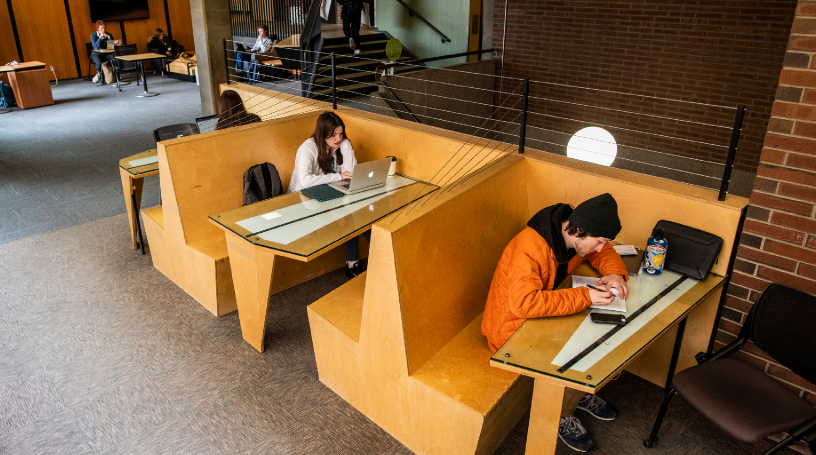Table of Contents
The most common presenting concerns for mental health counseling on our campus are anxiety and depression.
Faculty and Staff are often the first to notice that a student may be struggling.
Signs a student may be struggling
Some things to be on the lookout for in students are:
- Changes in behavior— increased withdrawal in class, visibly upset, late or missing assignments or tests.
- Changes in mood.
- Absent from class after attending regularly.
- Stark decline in performance.
- Showing irritability or agitation.
- Verbal or written statements suggesting poor mental health or thoughts of suicide.
- Changes in appearance—more disheveled or poor hygiene.
- Experiencing panic attacks in class.
- Reporting problems with sleep and/or appetite.
Reach Out
As faculty, it is helpful to reach out and check in with a student if you observe some of the signs of distress. This lets them know you care and that you are a supportive resource. Here are some ways to do that:
Reach out.
It’s important to reach out when you notice changes in your students or have any sense that they might be struggling.
Be direct.
Ask how they are doing and share your concerns and observations:
“I’ve noticed you haven’t been as engaged in class, are you okay?”
Listen non-judgmentally.
Allow them to express how they feel, taking their responses seriously even if you may not think what they are experiencing is serious or correct.
Show support.
“I’m here to give you whatever help and support I can.”
Remember.
You are not committing to fix anything by simply reaching out and starting a conversation. Sometimes simply talking and sharing areas of struggle is all the student may need.
Learn more.
For more information on reaching out to a student, visit the MSU Assist page at www.montana.edu/assist.
Resources for students
Not all students need counseling if they are struggling. Sometimes asking them about who they talk to when they need support or what has been helpful for them to do in the past is a good reminder for them to access that support.
Be aware of resources available to students and suggest those to them:
“Did you know there is a counseling center on campus? They meet with students for all kinds of concerns — how about we call them together?”
“I know that the Dean of Students and CPS are good sources of support and guidance for students who are struggling. Is there a particular office you feel comfortable reaching out to?”
Resources on campus to support student mental health
As faculty it is important to know the many resources available to students that help support their mental health and wellness here at MSU.
Dean of Students
The Dean of Students can assist if you are concerned about a student (see CARE Referral) and it can also be a helpful resource to remind students about if they need assistance during an extended absence due to illness or other life event.
Allen Yarnell Center for Student Success
Student Engagement
To find student clubs, ways to get involved in student government and volunteer opportunities.
Student Wellness
Counseling and Psychological Services (CPS)
CPS provides individual, group and couples counseling as well as crisis hours, consultation hours, and educational/preventive programming. (see page 5 for more information about CPS services)
Health Advancement
Health Advancement has wellness coaching, services with dieticians, and other programming focused on overall health and wellness.
Student Health Services[BROKEN LINK]
Medical Services is a medical clinic on campus that provides acute care and same-day services, regular check-ups and medication management. They also have psychiatric providers on staff.
Campus Recreation
In addition to the fitness center, students can join group fitness classes, join a club or intramural sports, and engage in a variety of recreational/fitness programming. They also offer opportunities for Outdoor Recreation.
For more information about all the wellness resources on campus,
go to: www.montana.edu/counseling/mental-health-and-wellness.html
Counseling and Psychological Services (CPS)
CPS offers free and confidential counseling services to undergraduate and graduate students who are taking 7 or more credits. Students can pay the student health fee and access services if they are taking less than 7 credits.
Services offered at CPS
- Short-term individual counseling
- Group Counseling
- Couples Counseling
- Crisis Walk-in Appointments
- Drop-in Let’s Talk consultation hours
- Consultation for staff, faculty, and students
- Suicide Prevention training
- Workshops and training for students, faculty and staff
- Welltrack app: A self-help prevention tool free to MSU students
CPS meets with about 10% of the student population each year. Data shows that treatment at CPS is effective and students report finding it very valuable.
Students can call CPS at (406) 994-4531 to schedule an intake appointment or schedule online at www.montana.edu/counseling


Frequently asked questions about counseling services on campus
What if a student is in crisis?
If a student is in crisis, there is no wait to be seen. CPS sees students for walk-in crisis appointments and they don’t have to wait for an intake or for on-going sessions.
How long does it take to see a counselor for a first meeting?
The first intake meeting will usually occur within 5 days. At this meeting the student will meet with a counselor to share what’s brought them to counseling and allow CPS to obtain relevant information.
How long does it take to see a counselor for on-going sessions when there isn’t a crisis?
Students who are at risk or in-crisis do not wait for ongoing services. After the intake meeting, the average wait time for a counselor is 6 days. At peak times during the semester (Oct-Nov; Feb-March) the wait for some students can be from 2-4 weeks. Factors that contribute to students waiting longer include:
- Choosing individual sessionsover group counseling
- Choosing to wait for a specific counselor
- Students with very limited time in their schedules for counseling appointments.
What if a student has to wait for assignment for on-going sessions?
A variety of resources and support options are provided to students during their intake:
- Options for walk-in services and after-hours crisis support
- Single session and Let’s Talk services
- Self-help and self-directed support though the WellTrack app.
- Additional resources/support on campus from partnering agencies
- The ability to start group counseling sessions, often within days
- Care management services for referral to off-campus providers
Who works at CPS?
CPS is staffed with licensed psychologists, counselors, and social workers with expertise in college mental health.There are also several interns and clinicians working towards their licenses who are supervised by licensed staff.
What if a student doesn’t like their counselor?
If a student doesn’t feel like they have a good match with their assigned counselor, they can easily request to be matched with a different counselor.
How many sessions can students have?
CPS utilizes a brief counseling model to provide a “dose” of counseling for assistance with shorter-term issues. This allows as many students as possible to access these resources and keeps the wait time relatively low. If students want longer term services, encourage them to meet with someone at CPS and then they will assist the student in finding the appropriate services for them off campus. Also, group counseling is an option for longer term services at CPS and often is just as effective, if not more effective than individual counseling for many students’ presenting problems.
Is there a cost for counseling?
All students are eligible for an intake appointment or crisis appointment regardless of whether they have paid the student health fee. Counseling is covered by the student health fee, so students don’t have to pay additional fees or use their insurance when accessing services at CPS. Students taking 7 or more credits are automatically assessed this fee, or students may opt in to pay if they are taking fewer credits. If you hear a student say they had to pay for services, they either opted in for this fee on campus, or are seeing an off-campus provider.
Where can students access medication?
Providers in Student Health Services can work with students who want or need medication. There are also consulting psychiatric providers on staff if a student needs more specialized care. The on-campus pharmacy is a great resource for filling prescriptions.
What if a student isn’t sure if they need or want counseling?
Students can schedule a single session appointment with CPS at the main office or attend a walk-in appointment through Let’s Talk sessions across campus. They could also schedule an intake appointment to discuss their issues more fully or ask questions about counseling. They may also benefit from other campus services such as Wellness Coaching through Health Advancement or Success Coaching through the Allen Yarnell Center for Student Success, as well as from self-directed resources through the Welltrack app.
What if a student says they “can’t be seen” or “can’t get in?”
Students can always call CPS to schedule an appointment or use walk-in crisis appointments. You can encourage them to do so or walk them directly to the main office. Please keep in mind that sometimes students don’t want to seek services, so they might report that they “couldn’t get in” to parents or faculty to curtail the discussion. When a student comes to CPS, staff remain in contact with them until they indicate they have completed their services or indicate that they’re no longer interested in services.
What does MSU do to educate students about resources?
CPS and campus partners provide information about counseling and supportive resources in a myriad of ways, reaching around 8,000 folks each year. This includes workshops about mental health and mindfulness, as well as training about suicide prevention, how to assist someone experiencing mental health distress. CPS also connects with student groups across campus to help ensure they are receiving adequate and appropriate support.
What does MSU do for suicide awareness and prevention?
MSU has a robust comprehensive suicide prevention program, training around 2,000 people a year. We are the only campus in the Montana University System with a dedicated Suicide Prevention Coordinator. CPS and campus partners work collaboratively using the SPRC and Jed Foundation models for comprehensive suicide prevention. Additional information can be found at www.montana.edu/suicide-prevention.

Mental Health in the classroom
Mental health and wellbeing can be incorporated into any class curriculum or lab environment. It does not have to be a focus of the class--making some mention of resources or checking in with students does not have to take a lot of time, but it indicates that you care and that you know how to assist a student if needed. Here are some ways to do that:
Syllabus language
- Consider adding mental health resources to your syllabus. This is a great way to normalize help-seeking and links students to appropriate resources.
- The Center for Faculty Excellence has language you can cut and paste right into your syllabus.
Checking in on students throughout the semester
- Asking students how they are doing does not need to be lengthy or too involved. And checking in does not then mean you need to solve or fix whatever they may be dealing with. A brief check-in with the entire class, or with individual students as needed lets students know that you are someone they could approach if needed.
- Consider checking in during particularly stressful times of the semester, like mid-terms or before finals. Asking them how they are sleeping, eating, and taking care of themselves shows support and serves as a good reminder about the importance of self-care.
Destigmatize struggles and help-seeking by talking to students about the resources available for wellbeing and academic support.
- An example of how to do this is: “I know that mid-terms can be a stressful time of the semester. I just wanted to remind you all to take good care of yourselves during this time: make sure to get plenty of sleep and engage in self-care activities. Also, please remember to utilize campus resources for support, check in with your friends, and take care of yourselves.” Reference the link to mental health resources in the syllabus or provide it in class.
- Invite CPS or Health Advancement to speak to your class, department, or staff. We offer workshops on stress management, depression, anxiety, suicide prevention, college mental health and many other topics.
- Be mindful of due dates for assignments. Avoid having assignments due late in the evening so that students can prioritize their sleep as this is foundational to overall health and wellbeing.
- Consider allowing absences for mental and/or medical issues (mental health days).
Accommodations for Mental Health
- If a student has a diagnosed mental health condition that may be impacting their academic performance, they can work with Disability Services to request approval for accommodations.
- Please note, if a student reports that they are experiencing mental health distress, faculty members cannot require or ask for documentation from CPS or Student Health Services to confirm or verify a diagnosis, services, or symptoms.
- It is up to the discretion of the faculty member, as the manager of their own class, to consider flexibility with due dates or attendance if a student reports an event that may be impacting their mental health and thus, their ability to meet the demands of the curriculum.
- If a student has experienced an event that has had significant impact on their functioning, they may need to pursue a Leave of Absence for the semester. Encourage them to reach out to the Dean of Students for assistance with this process.
Safety considerations for discussing mental health in the classroom
If the topic of mental health comes up in the classroom or other academic setting, here are some helpful things to consider to ensure it’s a supportive, helpful classroom conversation:
- If students are sharing their experiences with mental health or other personal topics, please encourage them to speak from their own experiences to avoid generalizations.
- Specific details about someone’s experience with depression, loss, or trauma could be potentially triggering for others. It is helpful to maintain appropriate boundaries and avoid encouraging sharing of personal details or deepening the conversation, and always make sure that appropriate supports are in place if a student is activated by the content.
- Gently correct any misinformation a student may share about campus resources by providing accurate information.
- It is important to discuss resources available to students including crisis resources:
Crisis Resources
CPS
available M-F 8 am-5 pm
including walk-in hours for crisis
988
24-hour crisis line
741741
the national,
24-hour crisis text line
How to Submit a CARE referral
Faculty are encouraged to submit a CARE referral if they are concerned about a student’s well-being and it is a non-emergency situation. Faculty are also encouraged to reach out to the student directly and express their concern, but sharing this information on a CARE referral is also helpful.
The referral will be reviewed by the CARE team (comprised of Dean of Students staff and other members of the university community). They will then follow up with the student with the appropriate resources, if needed.
If you are concerned about a student’s academic performance, you can send an early alert referral through the Allen Yarnell Center for Student Success to access academic support for that student.
Suicide Prevention
Death by suicide is unfortunately the second leading cause of death for college aged students. Every death by suicide is a tragic loss and impacts the campus community.
Although people have many different beliefs about suicide, it is the most preventable kind of death and almost any positive action can help save a life. A large part of creating a culture of care on campus is encouraging faculty, staff, and students to know the signs of suicide and the steps to take to get that person the appropriate resources.
For more information go to: https://www.montana.edu/suicide-prevention/training.html
When a student is in significant distress or experiencing a crisis
If you are worried about a student or know that they are experiencing thoughts of suicide or other forms of intense mental health distress, know that you are not alone in helping that student.
CALL
Call CPS 406-994-4531 available to offer consultation if it is not an imminent crisis.
WALK
During operating hours (8-5, M-F), you can walk the student to CPS or call 406-994-4531 to schedule a same-day crisis appointment for the student.
SUBMIT
Faculty and staff can submit a CARE referral through the Dean of Students office. This online submission is reviewed by the CARE team who will reach out to the student directly.
 If you are worried about the immediate safety of a student, call the crisis line
at 988 or University Police Department at 911.
If you are worried about the immediate safety of a student, call the crisis line
at 988 or University Police Department at 911.
MSU ASSIST: https://www.montana.edu/assist
MSU Assist was developed for faculty and staff to know what steps to take when a student presents with mental health concerns or to assist a student in crisis.
In the aftermath of a student death
MSU has a detailed Postvention Protocol in response to a student death or suicide. Campus administrators and CPS work collaboratively to identify students who may be impacted by the death and provide immediate grief counseling and crisis support. They will also work with faculty and other students to identify additional students to notify and/or provide support. See the Postvention Protocol for a complete explanation of these procedures.
- Campus-wide notification regarding a student death or suicide is typically not provided unless there is a threat to the safety/security of others. Safe messaging guidelines and suicide prevention experts recommend this for several reasons, including:
- Mitigation of trauma/risk by hearing about a death in this manner
- Reducing the likelihood of suicide risk/contagion amongst those vulnerable to such actions
- Avoidance of notifying or potentially upsetting individuals who are not directly impacted
- Ensuring those notified are provided or aware of crisis and grief support information
- Respecting the privacy and confidentiality of the individual and their family
- Because of this, all faculty/staff may not be aware of a student death on campus and may hear about this from a distressed student. Regardless of whether a faculty/staff member knows about a student death, they are encouraged to respond just as they would if a student disclosed a personal struggle, providing empathy, support and referrals to support services. They can also notify the DOS or CPS about additional students who may be directly impacted and in need of group support.
For a more complete overview, consult our Mental Health Services and Crisis Protocol.

Training for Faculty
Creating a culture of care is important at MSU. To do this, faculty and staff are encouraged to take trainings focused on how to reach out to students who may be struggling and trainings focused specifically on suicide prevention.
Trainings offered by CPS:
- Mindwise SOS: This 30-minute training teaches students how to recognize signs of distress/suicide and how to provide support and referrals.
- Question, Persuade, Refer (QPR): An hour long, in person suicide prevention training.
- Mental Health First Aid (MHFA): A day long, in person training focused on how to recognize signs and symptoms of mental health and ways to help others get the appropriate support.
- For more information and how to register, please go to: https://www.montana.edu/suicide-prevention/training.html
The Center for Faculty Excellence has numerous training courses for faculty throughout the academic year. Visit their website to find out topics and dates.
Support for Faculty
Your health and wellness is also critically important. We want to encourage you to focus on taking care of yourself just as much as you focus on your students, your work, and others in your personal life.
Tips for taking care of yourself:
- Set boundaries with your students. You want to be approachable but also not the only person a student is willing to open up to. For example, encourage them to use your office hours rather than emailing or texting back and forth outside of normal business hours.
- Engage in your own daily self-care activities.
- Connect with other faculty, friends, and your family in meaningful ways
- Reach out for help when needed
- Talk with other faculty about challenges with students and get support from your colleagues.
If you find that you need support for your overall wellbeing and mental health, please refer to resources through HR and MUS wellness:
MSU Employee Assistance Program 1-866- 750-1327; https://choices.mus.edu/eap-work-life.html
MUS Wellness: https://wellness.mus.edu/
The Faculty Guide was developed by the MSU Student Mental Health Advisory Committee members: Kevin Amende, Justin Arndt, Betsy Asserson, Michael Babcock, Tracy Dougher, Phillip Gales, Yves Idzerda, Brian Kassar, Stephanie McCalla, Abbie Richards, Laura Thum and Madi Dunne.

